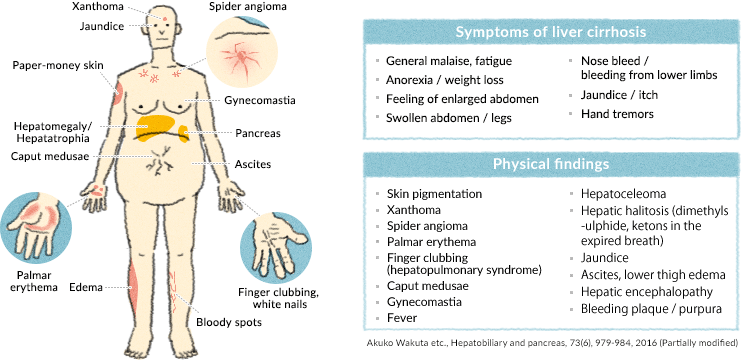Early detection of "silent" liver cirrhosis
Typical symptoms of liver cirrhosis

The liver is known as a silent organ, as even when a liver failure occurs, the symptoms often go unnoticed. When symptoms such as jaundice become apparent, the disorder will have already reached an advanced stage.
When liver function declines, your body will feel sluggish; you will feel tired and lose your appetite. In addition to these systemic symptoms, you may also develop symptoms such as those shown in the diagram above. If you have any of these symptoms, consult your doctor as soon as possible.
The classification of liver cirrhosis is determined according to the appearance of symptoms: liver cirrhosis resulting in obvious symptoms such as jaundice, ascites (accumulation of fluid in the abdomen), and hepatic encephalopathy (confusion and coma) is called decompensated cirrhosis, whereas liver cirrhosis that does not produce these symptoms is called compensated cirrhosis.
Blood tests to find abnormalities in your liver
Liver cirrhosis is a disease which causes a hardening of the organ. Nodules and irregularities form both inside and on the outer surface of the liver; these changes can be detected through an ultrasonic examination or CT scan. Because the function of the liver only decreases gradually, liver cirrhosis often goes undetected and unnoticed. Because of this, it is important to have regular examinations.
Summaries of the common blood tests used are listed below.
- ALT (GPT)
- This test detects the presence of the enzyme alanine aminotransferase in the bloodstream. Because this enzyme is usually only found in the liver, if detected in the bloodstream it indicates that the liver has been damaged causing the enzyme to leak out.
Reference range: 4 to 43IU/L
- AST (GOT)
- This test detects the presence of the enzyme aspartate aminotransferase in the bloodstream. This enzyme is also usually only found in the liver, so an increased amount in the bloodstream indicates liver damage.
Reference range: 7 to 38IU/L
- Albumin
- Albumin is a protein that is exclusively made by the liver and accounts for more than half of the protein in the blood. When liver function decreases, the value of albumin also decreases.
Reference range: 3.8~5.1g/dL
- γ-GTP
- Gamma-glutamyltransferase (γ-GTP) is an enzyme produced in the liver. When alcohol intake is high, or fatty liver is present, the amount of the enzyme found in the blood increases.
Reference range:
Men 73IU/L
Women 48IU/L
- Total Bilirubin
- Bilirubin is a pigment made when red blood cells are broken. When the function of the liver decreases, the amount of bilirubin in the bloodstream also decreases.
Reference value 0.2 to 1.2mg/dL
Consult your doctor, pharmacist, or nutritionist about your daily intake of protein and calories.






